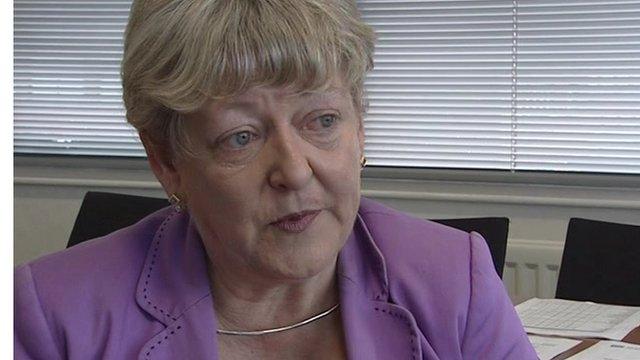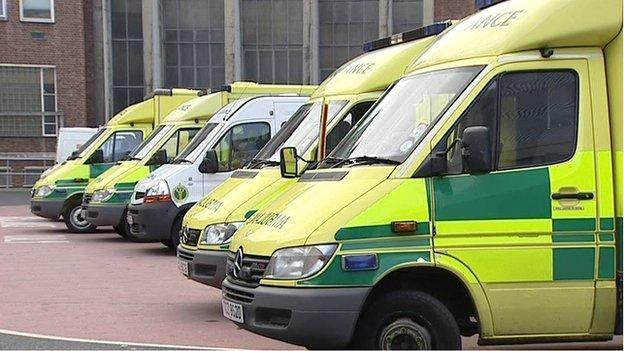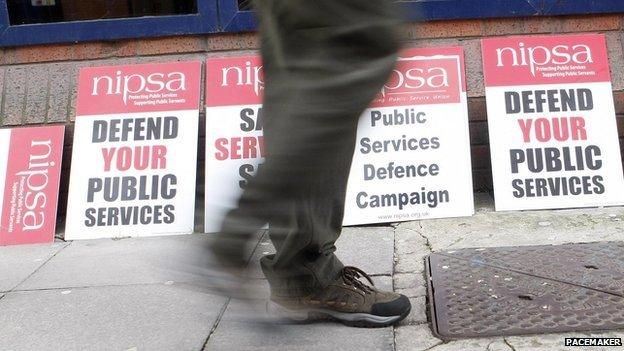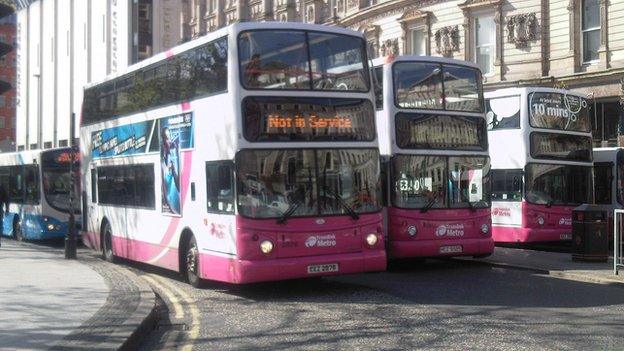NI strike: Ambulance Service says 'major incident' will remain in place
- Published
Jon McPoland said at midnight on Friday, there were seven crews available for all emergencies across Northern Ireland
The Ambulance Service has said it will keep a "major incident" in place for the remainder of today's strike.
Paramedics were ruled out of strike action on Thursday evening when management declared a "major incident".
Staff were canvassed on Friday to see if they would remain on duty to respond to serious and life-threatening calls if the major incident was stood down.
Only 10% of the 41 crews said they would remain on duty.
The Ambulance Trust said in the absence of a concrete commitment from enough staff to sustain a safe service, the trust said it had been left with no option but to keep the major incident in place.
The trade union, Unison, said the decision came as no surprise to them and that there was a serious loss of good will among ambulance staff.
In a text to staff at 2340 GMT on Thursday, the Ambulance Service said: "Please be advised that a major incident has been declared due to critical levels of cover and in line with the guidance issued by your union you are expected to report for duty as normal."
Management said they had been forced to take the measure "to maintain a safe level of ambulance cover".
Unions reacted angrily accusing management of "pulling a stunt" and said the move was "provocative".
Patricia McKeown, from Unison, questioned why a "major incident" was declared two hours before industrial action was to begin
The Ambulance Service said it was "inundated" with calls saying staff would be striking.
In a statement to the media, it said it had "exhausted all alternative contingency options, and lives would be at risk if we allowed the situation to deteriorate further".
Due to previous agreements between management and unions, it meant crews were required to turn up for duty on Friday.
In a tweet, the Ambulance Service added: "Two cities and many towns without ambulance cover is the only reason NIAS declared major incident."
John McPoland of the Ambulance Service said at midnight there were seven crews available for all emergencies across Northern Ireland.
"If we hadn't have declared a major incident because the level of services had decreased so much, we would be left with a situation this morning, where rather than having to explain a major incident, I could have been in here trying to explain to some family why a child who was choking in Newtownabbey, a three-month-old child, had perhaps died," he said.
"Last night we had no crews to respond to any emergencies in Belfast".

Analysis: Marie-Louise Connolly, BBC Northern Ireland health correspondent
This is an extremely serious development; an obvious breakdown of communication between both parties - management and unions.
Last night, the NI ambulance service received a steady stream of calls from ambulance crews saying they were withdrawing their labour at midnight.
A decision was taken by management to declare a major incident across Northern Ireland.
That was due to not having enough staff as opposed to there actually being an incident.
Many people are furious, accusing management of acting in bad faith. Those I spoke to said management had been told as early as last Friday that there would be a substantial walkout.
They said there was inadequate forward planning.
In a worrying development, there is talk of further action, what's been described as triggering a blue flag day.
That is when crews book a sick day on a date agreed among themselves with little or no notice given in advance to management.

However, some paramedics described management's response as "despicable" and a "purely tactical measure".

Patricia McKeown of Unison said the move could be "irreparably damaging industrial relations"
Ambulance crews had earlier agreed to respond only to 999 calls for cases that are life-threatening.
Patricia McKeown of the union, Unison, said the service's decision to "declare a major incident across the whole of Northern Ireland two hours in advance of strike action is provocative".
"There are no indications that such a major incident exists," she said.
"Ambulance staff have the right to strike and we will support our members who chose to exercise their right. By declaring a major incident NIAS has effectively binned the agreements reached earlier."
She said the Ambulance Service move could be "irreparably damaging industrial relations".
Kevin McAdam of Unite accused management of "pulling a stunt".
"We advised our members to return to normal roles in response to the NIAS's action in line with undertakings we had given," he said.
"The trade unions know now the facts on the ground: that there was no major incident, rather there was an inability and unwillingness for management to effectively manage the strike.
"We are unhappy and disgusted by the NIAS cynically exploiting this part of the emergency cover understanding to thwart the industrial action."
- Published12 March 2015

- Published13 March 2015

- Published11 March 2015

- Published9 March 2015
